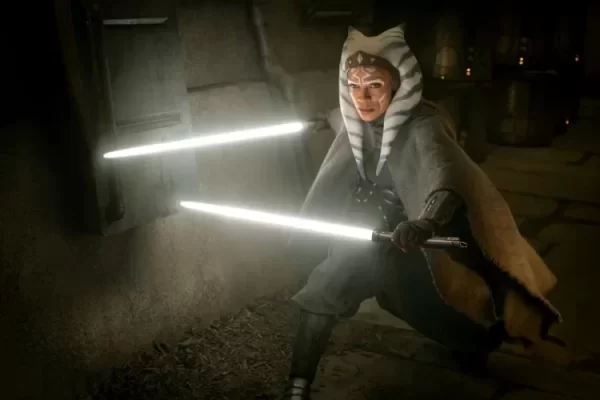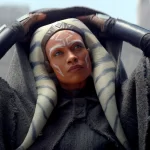“I am no Jedi.”
Despite my deep love for Star Wars, it wasn’t until I was 18 that I finally started watching the many TV shows the franchise has to offer. Before I did this, however, I was loosely familiar with two lines I’d heard quoted here and there. They were “I’m sorry, Master, but I’m not coming back” and “I am no Jedi.”
I watched both The Clone Wars and Rebels eagerly awaiting these lines. They felt like fixed moments in time, points of no return. And while my heart broke at the finality of how Ahsoka walked away from the Order, nothing can ever compare to Twilight of the Apprentice. Everything about those episodes is masterfully done, from the cinematography to the music to Ezra and Kanan’s arcs, but Ahsoka stands at the heart of it all. Ahsoka finally faces Vader, knowing that he was once Anakin Skywalker. She makes her stand regardless.
Then comes one of the heaviest and most intense lines in all of Star Wars history.
Ahsoka tells Vader she will avenge Anakin’s death if he is truly gone. Vader responds with “Revenge is not the Jedi way.”
“I’m no Jedi,” Ahsoka answers firmly. And she dives into battle against her former master.
(I still get chills.)
For Ahsoka’s entire life, being a Jedi was her purpose. She grew up in the creche, became a Padawan under Anakin at fourteen years old, and fought in the Clone Wars for three years. Walking away from the Jedi when she was falsely accused meant walking away from everything she’d ever known.
It’s not a secret that the Jedi Council – and the Order as a whole – had many flaws. Their censure of attachment, their roles as war generals, their treatment of the clone army – the list goes on. There were good parts and bad, but Palpatine’s ability to destroy the Jedi from the inside showed how deep the cracks went.
All this is to say – it might’ve been hard for Ahsoka to leave the Jedi, but they weren’t without fault. And, in the sixteen years between her walking away and her confrontation with Vader, you can tell she came to acknowledge that herself. It’s also significant that, for the sake of avenging Anakin, she’s willing to forsake all that the Jedi taught her.
However, despite all of the emotion and power behind this line, and the way it marks a division between Ahsoka’s past and present, it’s almost as if Star Wars has been trying to forget she ever said it.
From Malachor to Corvus
Ahsoka’s made several TV appearances since Rebels. There’s been season 7 of The Clone Wars, an episode of season 2 of The Mandalorian, and half of Tales of the Jedi. The Clone Wars had Ahsoka working with the Jedi for the last time, almost ready to return to them when Order 66 suddenly strikes. With the Order burned down, Ahsoka leaves behind her lightsabers and lets go of her identity as a Jedi for the second time.
However, she is seen again in season 2, episode 5 of The Mandalorian – an episode curiously titled “The Jedi.” In it, Din finds Ahsoka and asks her to train Grogu in the ways of the Force.
Rosario Dawson does an absolutely incredible job of portraying Ahsoka. It’s not just the voice – even her most subtle acts, from the way she walks to the way she moves her hands, echo Ahsoka from The Clone Wars perfectly. Despite this, however, Ahsoka in The Mandalorian is a very different Ahsoka than we’ve seen in The Clone Wars and even Rebels. Ahsoka used to be a reckless teenager who didn’t put much stock in the Code. In Rebels, you could tell she’d lost some of her wildness and naivete. She took on the role of a teacher, helping Kanan train Ezra as she aided the Rebellion. But she never dissuaded either of them from forming attachments with one another and the Ghost Crew.
Season 2 of The Mandalorian takes place roughly twelve years after Ahsoka was last teamed up with the Rebels company. We know, from the end of that show and Ahsoka’s actions in “The Jedi,” that she’s been searching for Ezra. Interestingly, though, she tells Din she cannot train Grogu because he is attached to Din. This was never an issue when it came to her training of Ezra.
Ahsoka cites the fall of Anakin as her reason for not teaching Grogu. It’s certainly worth looking into the cause of Ahsoka’s mindset shift from Rebels season 2 to The Mandalorian. For over fifteen years since Order 66, she believed that Anakin had died with the Jedi. But when she realizes that he has become Vader, she has to decide whether or not to face him. When she makes her choice, she claims that she is a Jedi no longer. She fails to bring Anakin back from the dark side and tells Ezra in the World Between Worlds (Rebels season 4, episode 13) that she’s accepted she can’t save her old master.
And now, years later, Ahsoka looks down on attachment and doesn’t argue when Din refers to her as a Jedi. Does she regret her bond with Anakin? Has her experience with Anakin/Vader changed her ideas of what it means to be a Jedi?
Regardless, it does seem as if Ahsoka has taken up this title once more. But it does bear asking – does this mean she is identifying herself as an Old Republic-Era Jedi?
The Mandalorian hasn’t been her only appearance in the last couple of years. Tales of the Jedi was released in 2022. In its first episode, we see Ahsoka as a toddler. When she is able to connect with a raxshir, the village chief, Gantika, tells Ahsoka’s parents that this means Ahsoka is a Jedi.
Despite the fact that all Force-users aren’t automatically Jedi, I understand why Gantika would say this – she obviously wouldn’t know many (if any) Force-users who weren’t associated with the Jedi. But with that line and the title of the show, it’s as if Star Wars is trying to force the title of Jedi back onto Ahsoka.
“Jedi” across the years
From an outside perspective, “Jedi” refers to anyone who wields the Force and a lightsaber. But there should be a marked difference between the Jedi of the Old Republic and the Jedi of the New. With the Council long gone, the old rules of forbidding attachment technically don’t need to be followed anymore. After all, Leia underwent Jedi training alongside Luke, and the two of them were attached to each other and their family.
(However, from what we see in The Book of Boba Fett, Luke gives off the impression of clinging a little too tightly to the old Code… which we know leads to disaster when he tries to train Ben Solo. But all that’s a discussion for another time.)
So, with the Ahsoka show coming out this very week, the question stands: Will Ahsoka still call herself a Jedi? And what will that mean for her?
I can understand and accept Ahsoka reshaping the identity of being a Jedi in this day and age, as well as her reclaiming the title in the memory of all the Jedi who were killed in Order 66. But unless the Ahsoka show is willing to draw the difference between being a Jedi then and now, it’ll be disappointing. Ahsoka’s most significant line was about her refusing to be regarded as a Jedi. You can’t undo that without diving into what the title means to her – and why she’s comfortable using it once more.



